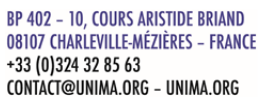To UNIMA Centers and their respective representatives,
In response to questions regarding the recent decision concerning the duties of Mr. Dimitri Jageneau, we wish to clarify the legal and procedural basis for the actions taken by the Executive Committee (EC) and the Cabinet, ensuring adherence to the UNIMA Statutes and Rules of Procedure
- Constitutionality of Mr. Jageneau’s Suspension
The Executive Committee (EC), as per Statutes §4.c.2, is responsible for ensuring compliance with the Statutes and Rules of Procedure. The decision regarding Mr. Jageneau’s role was made in alignment with these statutes and with the responsibility of the EC to direct UNIMA’s activities between Congresses.
Additionally, Rules of Procedure IV.D.10(b) state that when there is a violation of UNIMA’s Statutes or Rules of Procedure, it is the responsibility of the President to seek resolution through mediation or initiate exclusion procedures. Mediation efforts first took place during the conference in Bali in 2023 but did not lead to any change in the behaviour of Mr. Jageneau. After repeated actions of Mr. Jageneau, the EC decided to install a review committee including a mediator, and at that time notified both Mr Jageneau and National Center representatives of this decision. If Mr. Jageneau’s actions were deemed in violation of his duties, the EC had grounds to intervene.
Moreover, under Statute §2.c.1, membership or a role within UNIMA can be revoked due to:
- Activities no longer complying with the fundamental principles of UNIMA, or
- Serious infringements of the Statutes.
If the EC determined that Mr. Jageneau’s conduct violated his responsibilities as outlined in
- 4.c.4—which include coordinating UNIMA activities and managing the Secretariat—then this decision aligns with the statutory powers vested in the EC.
Since the General Secretary’s conduct was under review EC did not violate the Statutes by limiting Mr. Jageneau’s activities:
-
- The EC did not remove or replace the General Secretary, which would require Congress approval (Statutes §4.a.6.10).
- The EC only limited certain activities while an internal review was underway—which falls under their responsibility to ensure proper governance.
- The EC had a duty to act in cases of internal conflict or potential statutory violations
(Rules of Procedure IV.D.10(b)).
- The EC acted within its responsibility to maintain governance and operations under
Statutes §4.c.2 and Rules of Procedure IV.D.10(b).
However, before a final decision could be made, the General Secretary resigned.
The EC’s decision to not publicly disclose the accusations earlier was based on standard
governance protocols that prioritize:
Protection of individuals involved:
Accusations against an elected official require careful handling to avoid reputational damage, misinformation, or undue influence before an official investigation is conducted. The EC took care to communicate the situation to Mr Jagenau and appropriate National Center representatives with as much care as possible. Mr. Jageneau chose to escalate the information into the public sphere through social media posts.
Ensuring due process before public disclosure:
Rules of Procedure IV.D.10(b) states that when violations of the Statutes occur, the President must first seek resolution through mediation and negotiation before initiating exclusion procedures. This means the EC was required to attempt internal resolution first before involving all Councillors or National Centres.
Rules of Procedure IV.D.6 allows the EC to conduct urgent decision-making via internal voting, ensuring that sensitive matters are first debated privately before publicizing decisions.
Thus, the EC followed governance procedures by addressing the issue internally first. The decision not to immediately inform the Councillors or National Centres was based on maintaining confidentiality, due process, and professional ethics in handling internal conflicts.
- Authority of the EC to Convene Meetings and Make Decisions
The meeting held on February 14, 2025, in the absence of the General Secretary, was conducted with full transparency as a continuation of the agenda of January 24 Executive Committee meeting. Mr. Jageneau was included in all correspondence regarding both meetings and the EC fully expected his presence. However, Rules of Procedure IV.D.3 states that an extraordinary meeting of the EC may be convened by the General Secretary, but also by the President or at the request of at least one-third of the EC members. Therefore, even in Mr. Jageneau’s absence, the EC was acting within its authority.
Furthermore, Rules of Procedure IV.D.2 states that the EC has the right to take decisions if at least one-third of its members are present, and decisions are taken by simple majority. If quorum was met, the decision-making process was valid.
Additionally, Rules of Procedure IV.D.10(b) states that when the President is informed of violations of the Statutes or Rules of Procedure, they must:
“Try to find a solution through information, mediation and/or negotiation, and initiate, if necessary, a procedure for the exclusion of the relevant member or National Center.”
This implies that certain disciplinary matters require internal mediation before broader disclosure.
We recognize the concern raised regarding transparency and will review internal communication processes.
The EC has the power to take action against the General Secretary when deemed necessary, but the procedure requires a structured process.
- Rules of Procedure IV.D.10(b.2) states that if mediation fails, the President can initiate a procedure for exclusion. This implies that the EC, through the President, has the authority to take measures against an official if they violate UNIMA’s principles or governance rules.
- Statutes §2.c.1 states that a person can be excluded from UNIMA if their activities no longer comply with the fundamental principles or if they commit serious infringements of the Statutes.
- Rules of Procedure IV.D.2 states that the EC can make decisions with a simple majority if one-third of members are present. This means that if an investigation found wrongdoing, the EC had the authority to take appropriate disciplinary action.
Since the General Secretary’s conduct was under review EC did not violate the Statutes by limiting Mr. Jageneau’s activities:
-
- The EC did not remove or replace the General Secretary, which would require Congress approval (Statutes §4.a.6.10).
- The EC only limited certain activities while an internal review was underway due to serious accusations and verbal reports—which falls under their responsibility to ensure proper governance.
- The EC had a duty to act in cases of internal conflict or potential statutory violations
(Rules of Procedure IV.D.10(b)).
- The EC acted within its responsibility to maintain governance and operations under
Statutes §4.c.2 and Rules of Procedure IV.D.10(b).
The EC was in the process of forming a mediation group when the General Secretary chose to resign voluntarily before any final decision was made.
Rules of Procedure IV.D.11(h) states that the General Secretary is responsible for convening meetings and managing the Secretariat. Since the resignation was public, the EC had no need to complete the investigation process, as the position had already been vacated.
Statutes §4.a.6.10 states that the Congress is responsible for electing a new General Secretary. Since the position is now open, the EC must focus on the election process at Congress rather than on disciplinary action against a former official.
- Interim Leadership and Responsibility for the General Secretary’s Duties
With Mr. Jageneau’s resignation, we acknowledge the importance of clarifying who will undertake his responsibilities. While the Statutes do not explicitly outline a succession process in this scenario, Rules of Procedure IV.D.5 states that if a Chairperson of a Commission is absent, the EC can appoint a temporary replacement.
Statutes §4.a.6.10 states that the Congress elects the General Secretary, meaning the EC cannot unilaterally appoint a replacement.
The EC can only delegate the General Secretary’s responsibilities, not replace the position. Statutes §4.c.2 grants the EC power to direct UNIMA’s activities between Congresses, meaning they can assign temporary administrative duties to other EC members.
Rules of Procedure IV.D.11 outlines the General Secretary’s responsibilities (e.g., convening meetings, coordinating activities). Since there is no official succession procedure, the EC must divide these tasks among existing members rather than appoint a new Secretary. The EC cannot appoint an interim General Secretary but can temporarily distribute the responsibilities among EC members under the supervision of the President.
The EC is currently working on a plan to ensure a smooth transition of responsibilities until Congress, where a new General Secretary can be elected (Statutes §4.a.6.10).
- Transparency and Conflict Resolution
We acknowledge the concerns about transparency and conflict resolution. UNIMA is committed to fostering cooperation and mutual understanding, as per its Preamble and §1 (Aims and Means), which emphasize ethical practices and peaceful mediation.
However, Rules of Procedure IV.D.10(b) clearly state that in cases of urgent matters such as statutory violations, the President must take appropriate measures. Rules of Procedure IV.D.6 also allow for urgent decision-making through electronic or postal voting if required. The EC followed established procedures, though we recognize the need for improved communication.
Moving forward, the EC will review conflict-resolution mechanisms to ensure adherence to these principles and explore external mediation options for future governance challenges.
- Request for a Plan of Action Before Congress
The EC will present a clear action plan before the Congress in May 2025, detailing the interim leadership and management of the Secretariat.
Additionally, Rules of Procedure IV.A.6 states that the Congress decides on the aims and objectives of working commissions for the next four years. This means that any necessary reforms can be proposed and implemented during Congress.
Reaffirming UNIMA’s Mission and Values
As a non-governmental organization dedicated to the promotion of puppetry, UNIMA remains committed to cooperation, inclusivity, and ethical governance. We appreciate the dedication and commitment of all UNIMA Centres in upholding these values.
On Behalf of the Executive Committee of UNIMA

L’Union internationale de la Marionnette est soutenue par le Ministère de la Culture, la Région Grand-Est, le Département des Ardennes et la Ville de Charleville-Mézières et reconnue par l’UNESCO comme ONG.

